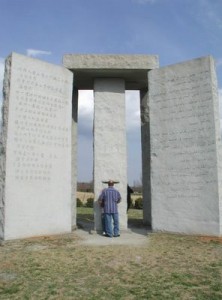This post at Technology Review muses about what happens if high tech crashes. Would our store of technical knowledge, which is increasingly found exclusively in digital form, survive? Or would we suffer a terrible backwards slide as people struggle to reinvent what was once taken for granted?
Glenn takes this to its logical conclusion, saying that there should be efforts to build an Encyclopedia Galactica. A vast repository of knowledge, the sum total of everything known up to this time, could be printed in a durable form and cached in a remote area. If any of the myriad civilization-smashing dooms should come to pass, then there would be a base of knowledge that would allow the survivors to rebuild in a very short period of time.
This dovetails neatly into the Social Cycle Theory of history, a discredited model that states flourishing civilizations are doomed to descend into periods of darkness and barbarism. Vast libraries might be constructed in cosmopolitan cities where culture and knowledge are revered, but those same books filling the libraries are going to be burned by illiterate savages when they sack the toppled empires.
So, if it is impossible to avoid the total destruction of all you hold dear, wouldn’t it be neato-keen to squirrel enough knowledge away so that the contributions made by your culture to the human condition are not lost?
There actually has been at least one effort to do this very thing that I am aware of. Known as the Georgia Guidestones, they are massive slabs of rock arranged in such a way that many are reminded of Stonehenge.
(Picture source.)
The stones were erected by a local company in 1980, the money for the project coming from a mysterious individual who insisted upon total anonymity. To this day, no one is sure who is behind all this.
But, interesting though this might be, there are some serious flaws with the Georgia Guidestones. The first being that they are located just a few miles outside of a town in Georgia, are easily visible from a major road running nearby, and are accessible by the public at any time. This has led, sadly but predictably, to acts of vandalism.
(Picture source.)
Obviously, any storehouse of knowledge would have to be located far enough away from centers of population to survive the rampaging hordes as civilization crashed and burned. The Guidestones are just too accessible.
The other problem lies with the inscriptions etched into the stone, which are little more than New Age platitudes slathered with a healthy helping of anti-Humanity environmentalism. The best way to illustrate the uselessness and self-indulgent nature of the inscriptions is to mention that Yoko Ono has praised them as a ”a stirring call to rational thinking.”
The really important stuff needed to rebuild civilization, such as a step-by-step guide to animal husbandry, crop rotation, and the Germ Theory of Disease, are prominently absent. Supposedly the mundane, nitty-gritty details of how to feed yourself and avoid dying from dysentery are to be found in a time capsule that is supposedly buried underneath the slabs. Unless the capsule consists of several freight cars packed full of books, entire libraries shrink wrapped in plastic one meter thick and encased in a concrete vault, something tells me that the whole thing is a colossal waste of time and resources.
This isn’t to say that a project to preserve the knowledge necessary to jump start civilization is a bad one, if for no other reason that it would generate some interesting new methods for storing data so it would be available millennia hence. You can find a list of such projects, both practical and proposed, at this link.
Note, if you will, that the people behind these knowledge preservation schemes are more interested in guarding culture than passing on actual techniques needed to survive the savage and harsh landscape that would be present after our civilization fell. This strikes me as being unreasonable to the point of madness!
Instead of all this artsy-fartsy crap about being kind to Mother Earth and melding human law with tolerance, someone who was actually interested in preserving culture, civilization, and lives would go about it in a different way. They would bury a large cache of seed corn, basic tools and the means to produce more, single-shot rifles and shotguns with ammunition, and a bunch of manuals printed up by 4-H designed to instruct young farmers in the details of their profession.
Something tells me that I would never be able to get anyone rich enough to fund the project interested. After all, since I am talking about hard physical labor and guns, Yoko Ono would be sure to be against the whole thing!
(Cross posted at Hell in a Handbasket.)




I was recently watching a DvD set (still am; starting season 5) of a famous sci-fi series, and they got very advanced, had a war, and the future shows us Monks under candlelight who are busy transcribing – taking pen to paper – the previous history and achievements.
Don’t know what it would take to wipe out every hard drive but many things are….just in digital magnetized form.
Still prefer books to kindle.
I live about an hour from the GA Guidestones.
I’ve always enjoyed this theme in fiction, i.e. Foundation trilogy, Canticle for Leibowitz.
The trick would be to create a technology bootstrap that anybody could bury in their yard, relatively cheaply. Recovering civilization isn’t going to happen by one expensive Encyclopedia Galactica but by a billion ones, widely dispersed and privately undertaken.
I suspect EMP would be the practical impetus for such private deposits of information.
This dovetails neatly into the Social Cycle Theory of history, a discredited model
I don’t keep up, clearly.
Discredited by .. whom? Change happens, and time and again we see this in history. Rise, Fall, Repeat.
In the past this was isolated to a discrete location. Rome’s Fall didn’t much affect China, and visa-versa. Knowledge comes in from outside and boot-strap happens.
Problem is, now, we’ve come so far, so fast, that we’re all connected: any Fall now and in the future would be a global catastrophe. We’d better hope this culture doesn’t fall until we have a viable technological civilization off Earth to come to the rescue.
Rome’s fall was most likely from a more prosaic cause. The roads. For the first time in human history, travel was possible beyond a few miles (One thousand Roman paces). Alexander’s army traveled far but never returned and those that came back took years to do so. Only Rome with its magnificent roads could reach out to new diseases and return within the quarantine (four weeks) time. The result was leprosy, plague, smallpox and other diseases now extinct or changed too much to recognize. Modern DNA methods are starting to identify some of the diseases, such as plague in the Black Death era. Plague bacillus reached such high concentrations in the blood that the dna can be identified in dental pulp of skeletal remains. Attempts are being made to identify plague in Byzantium.
“Discredited by .. whom? Change happens, and time and again we see this in history. Rise, Fall, Repeat.”
It is discredited because it doesn’t just say that empires will rise and fall, dominant cultures will come and go. Instead, one of the linchpins of the theory is that it calls for a Malthusian catastrophe to close out the cycle. Mass famine, mass chaos, a breakdown of social order where the weak are eaten by the savage and strong. Mad Max lived for real.
The British Empire is no more, yet I haven’t heard of cannibalism becoming common practice in Leicester Square.
Michael Kennedy,
I’m with you. Our modern equivalent is air travel. The effect of disease on the dissolution of Roman society, particularly in the west is very under-played. Many want to use the societal collapse as a political cudgel to make a modern point. However, we know that even the ‘barbarians’ tried their best to emulate Roman societal structure. Rampant new disease best explains such a striking de-population of cities and loss of so much cultural knowledge. (not just human, but I suspect crop disease)
Byzantium’s ability to survive the many devastating plagues it was subjected to should be a marvel to us.
The Agrarian movement(not an organized movement in any sense) in this country is attempting to pass on a lot of knowledge about farming from the mid 1800’s to early 1900’s. Essentially they are kind of Luddites, but they have a point, that being, if the SHTF, we will not be able to rely on chemical fertilizers and mechanized tilling, planting and harveting equipment. So much of the knowledge of non-mechanized farming has been lost, these folks are attempting to disseminate it via the web from old almanacs and books in their collections. An admirable aim, sans the Luddite stuff. Worth printing some of it out, before you need it.
James Rummel,
I doubt you will hear of “cannibalism becoming common practice in Leicester Square.”
I believe human flesh is “haram”.